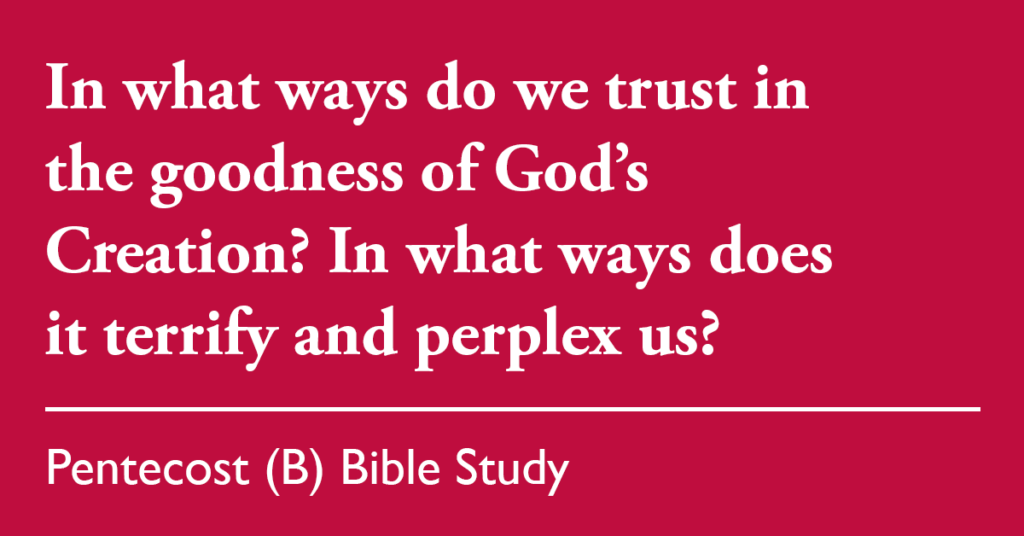This page is available in: Español
Bible Study: Pentecost (B) – 2024
May 19, 2024
RCL: Acts 2:1-21; Psalm 104:25-35, 37; Romans 8:22-27; John 15:26-27; 16:4b-15

Acts 2:1-21
We all know the story of Pentecost, of course. At 9 o’clock in the morning, the disciples gather, and the place where they meet is filled with a rush of wind and tongues of fire, and they speak in tongues that all can understand.
Many churches try to re-create this moment by asking parishioners to join aloud in a portion of the reading in whatever languages they can speak. The experience of listeners to such a cacophony of voices, however, is in many ways the opposite of the piercing clarity of understanding described on that first Pentecost.
Peter quotes the prophet Joel to explain what is happening: “I will pour out my Spirit upon all flesh, and your sons and your daughters shall prophesy, and your young men shall see visions, and your old men shall dream dreams.”
- What might Pentecost look like today? Do we dare to see visions and dream dreams?
- Of what might those visions and dreams consist?
Psalm 104:25-35, 37
Psalm 104 is a song in praise of Creation and of God’s care for all that is. God creates all things—even the uncounted living beings in the depths of the sea, and Leviathan, “made for the sport of it.” God sustains all things, giving them “their food in due season,” and, at the appointed time, takes away their breath so that they die and return to dust.
The psalmist does not pretend to understand all the mysteries and oddities and terrors of Creation, but nonetheless praises God, rejoices in the Lord, and cries, “Hallelujah!”
- In what ways do we trust in the goodness of God’s Creation? In what ways does it terrify and perplex us?
- What do you make of the idea that God created Leviathan “for the sport of it?”
Romans 8:22-27
The passage from Romans portrays a quieter Holy Spirit than that of the Pentecost story of Acts. Here we see a Holy Spirit that helps us not in a violent wind or tongues of fire, but through an intercession “with sighs too deep for words.” The Holy Spirit of Romans is more a kindly support and intercessor on our behalf than it is a fiery force that descends upon us, unexpected.
The readers of Romans have only “the first fruits of the Spirit” and wait in hope its complete fulfillment.
- What do you make of the different portrayals of the Holy Spirit in today’s readings?
- What might it mean that “in hope we were saved”—but a hope that is not seen?
John 15:26-27; 16:4b-15
In the Gospel, we find yet another lens through which we can see the Holy Spirit. Here we encounter the Holy Spirit as advocate and guide—an advocate that will testify on behalf of Jesus to the world and that will guide his disciples into truths they are not yet ready to bear.
Jesus tells his disciples that it is to their advantage that he leave them, because only then will the Advocate come to them.
- What might be the sorts of truths that we ourselves are not yet ready to bear? And how might we listen for the voice of the Holy Spirit guiding us in the direction of those truths?
- How might we understand the Holy Spirit as “the Spirit of truth”—as contrasted, perhaps, with the fiery flames of Acts or the sighing intercessor of Romans?
This page is available in: Español
Don’t forget to subscribe to the Sermons That Work podcast to hear this sermon and more on your favorite podcasting app! Recordings are released the Thursday before each liturgical date.
Receive Free Weekly Sermons That Work Resources!
This page is available in: Español


